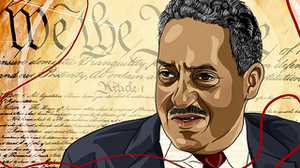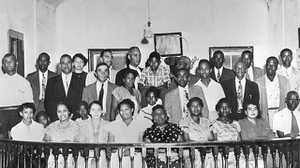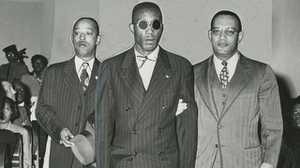Seeing Isaac Woodard
Remembering the WWII veteran beyond the vicious racist attack that blinded him.

Isaac Woodard was a Black World War II veteran who became known to the world as the victim of a horrific act of racist violence that robbed him of his sight. On February 12, 1946, Woodard was beaten and blinded on his way home from the war, hours after his honorable discharge. While that blinding came to define him in the eyes of the public, his life is less well known.
Woodard was one of nine children, born in 1919 to Sarah and Isaac Woodard, Sr. on a farm in South Carolina. Like many southern African Americans of the time, the Woodards were poor and lived as sharecroppers, working land that belonged to whites. As a child, Isaac himself worked in the fields, causing him to miss school. He ended his formal education at 11 years old, after finishing the fifth grade, and then left home altogether at age 15. Woodard knew the limits of educational and vocational opportunity for Black residents of his native Fairfield County and realized he would need to venture out to find better.
Better for the 15 year old was new kinds of grueling and often dangerous manual labor: laying railroad tracks, log turning for a lumber yard, construction and delivery jobs. Then in 1939, at age 20, Woodard joined the Civilian Conservation Corps. He served for two years in the New Deal public work relief program, which provided employment to rural young men during the Great Depression.
In 1942, Woodard was drafted into the U.S. Army for World War II. He was among the more than 675,000 southern Blacks who served abroad during the war, many hopeful that putting their lives at risk would provide entry to a better life and full participation in American society. Woodard completed his basic training in Bainbridge, Georgia, with further training in Pennsylvania, Virginia and California, before shipping out to the South Pacific in October 1944. He left behind a wife, Rosa Scruggs Woodard, who remained in Fairfield County.
Woodard served as a longshoreman in the 429th Port Battalion, a segregated combat support unit in the Pacific Theater. Loading and unloading military ships in the Pacific Ocean, he helped sustain Allied troops in their fight to recapture New Guinea Island from the Japanese. By the time Woodard arrived in the Pacific Theater, the New Guinea naval campaign had been underway for two years, and Australian, American and Japanese troops had all endured substantial casualties. Woodard himself came under extensive enemy fire. Though he wasn’t large in stature—at the time of his discharge he weighed 148 pounds and was 5 feet 8 inches tall—Woodard performed courageously and with distinction. He first earned a promotion equivalent to corporal rank and later sergeant rank for his leadership and capability. Ultimately, Woodard was awarded a battle star for service in a combat zone, the American Campaign Medal, the Asiatic-Pacific Campaign Medal and the World War II Victory Medal.
Woodard mustered out, a decorated veteran in uniform. But his experience in the Pacific combat zone was no preparation for what would happen on the last leg of his long journey home. Woodard rode a Greyhound bus from Augusta, Georgia, to South Carolina, where he was to reunite with his wife. When he asked the white bus driver if he could disembark to use the restroom, the driver cursed at him and refused to stop. “Talk to me like I am talking to you,” Woodard insisted. “I am a man just like you.”
At the next stop, in the small South Carolina town of Batesburg, the driver called on the local police chief, Lynwood Shull, to remove Woodard from the bus. Shull proceeded to arrest Woodard, beat him with a blackjack and gouge his eyes with it. Left unconscious and completely blinded in the Batesburg jail overnight, Woodard was led the next morning—still in uniform—to the city court, where he was fined for drunk and disorderly conduct.
Woodard was eventually transferred to a VA hospital in Columbia, South Carolina, where doctors determined there was no course of treatment to restore his vision. After two months’ convalescence, Woodard was escorted to New York City by two of his sisters. The family had moved to the Bronx while Isaac was serving abroad, themselves in search of greater opportunities. Woodard had to begin a sightless life in a new city, with no training for living with a disability.

The NAACP took up his case, however, and Woodard became a cause célèbre when the association’s executive secretary convinced legendary actor and director Orson Welles to publicize Woodard’s story on his radio program. Woodard participated in events across the country and spoke to audiences eager to hear the tragic story of a military veteran wronged in such an unthinkable fashion. A benefit concert was held for him at Lewisohn Stadium in Harlem, chaired by boxer Joe Louis and featuring speeches and performances by celebrities including Nat King Cole, Pearl Bailey, Canada Lee, Count Basie and Billie Holiday. Woodard received a five-minute ovation from the crowd of over 20,000 when he took the stage to describe his ordeal in a low, quiet voice.
But applause eventually faded and the public moved on from his story. After two trials, both criminal and civil, that failed either to bring his perpetrator to justice or award him damages, press coverage quickly waned. And once the spotlight passed him over, Woodard was left to fend for himself in obscurity. His wife, unprepared for the drastic detour to their lives, decided to leave their marriage.

Civilian life was filled with struggle and mundanity. Woodard had to fight the Veteran’s Administration to get benefits: Because the blinding happened after his discharge, the VA originally just provided partial payments. Only after writing a letter in 1952 explaining his need for assistance to his VA counselor, was Woodard’s pension increased to the contemporary equivalent of $14,000 per year.
Woodard was able to buy a home with the proceeds of his benefit concert. After the city of New York claimed the home by eminent domain, Woodard entered public housing but took the funds from the buyout to invest in a building in the Bronx with multiple tenants. His family assisted him in collecting rent from its several apartments and businesses, including a funeral home and a small factory. Though he relied on those family members for certain tasks, “my uncle was his own caretaker,” Woodard’s nephew Robert Young said in a 2019 commemoration. “He scrubbed his kitchen and bathroom floor on his hands and knees.”
Ten years after the attack in South Carolina, Woodard’s days assumed a quiet rhythm. A 1956 Jet Magazine profile on him—entitled “Isaac Woodard: America’s Forgotten Man”—described him doing “his morning rounds,” waving to neighbors and stopping at a newsstand and local shops. “I make out all right,” he said, “but I just can’t see.”
In the 1960s, Congress passed legislation that gave full disability to service members injured between the time of their discharge and their arrival at home. Woodard’s pension increased to today’s equivalent of around $45,000 per year. “My uncle bought a 1964 Chevrolet Impala,” remembered Young.
In 1978, with the help of a VA loan, Woodard increased his real estate investments by purchasing another home in the Bronx. He lived there with his sons Isaac Woodard III, whom he had with a new partner, and George, whom he adopted. In the late 1980s, Woodard began having health problems. He died in September 1992 at age 73 and was buried with other U.S. veterans at Calverton National Cemetery, in Calverton, New York.

In 2019, a plaque was dedicated in Woodard’s honor in Batesburg-Leeville, South Carolina at the site of his attack. “Woodard was beaten and blinded by a town police officer,” it reads. “The incident led Harry Truman to form a Council on Civil Rights and issue Executive Order 9981, which desegregated the U.S. Armed Forces in 1948.” The text is repeated below, in braille.
His family remembers these things but also knew the man as a son, a brother, a father, an uncle. “Uncle Isaac, you gave your family all of you,” said Young in closing. “You will always be an inspiration to many in our nation, but you will also always be my uncle Isaac.”







